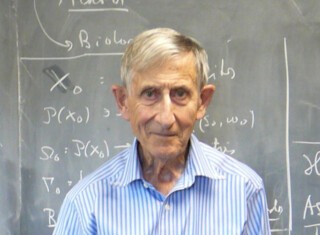‘Sorry my friend, but you goofed’
Jeremy Bernstein remembers Freeman Dyson
Over the years Freeman Dyson, who died on 28 February at the age of 96, corrected mistakes I made, often in print, with letters written with great gusto. One, dated 21 August 1981, written in his almost calligraphic hand, begins: ‘Sorry my friend, but you goofed.’ He goes on to say that what I had written about the Mercator projection in a piece on maps was total nonsense, and he provides a derivation of the projection and inserts some numerical values to see how good it is. There are many other examples in the letters I have from him and that is why I treasure the two occasions on which Freeman told me something that was actually wrong.
The first was sort of mathematical. In the process of our writing a paper together I was given the task of evaluating an integral. Freeman said that he was sure the sum was zero. I did not see why it should be zero and did not understand Freeman’s argument. I did the evaluation using my laptop and did not get zero, although the number I got was very small. When I told Freeman he was sceptical and thought that I had probably made a mistake. As it happened I was at the Aspen Centre for Physics and was able to persuade several colleagues to evaluate the integral. They found the same answer that I did. I told Freeman and he said that it should have been zero.
The second was linguistic. One of my favourite Italian sayings is Giordano Bruno’s ‘se non è vero è ben trovato,’ which I would translate as ‘even if it is not true it has been well argued.’ I got a note from Freeman saying it was not se but si. In French and Spanish the word for ‘if’ is si but in Italian it is se. Freeman reluctantly accepted this. But my two against his dozens and dozens of right answers is not much of a score. He was unique and impossible to replicate.

Comments
He replied immediately agreed with my observation.
"As you may imagine I am swimming in letters about Mercator. Yours was one of the most enlightening. Dyson, who also wrote, did the calculation with metrics and got the same answer. I am preparing an amplification."
((from my journal entry of 7 May 2001, http://zhurnaly.com/FanLetterFeedback ))